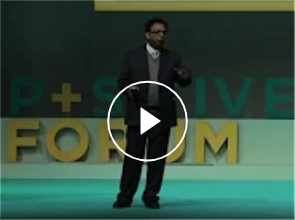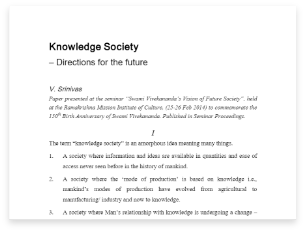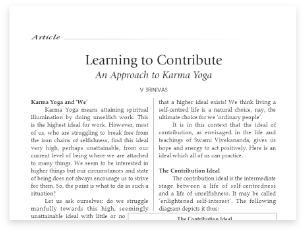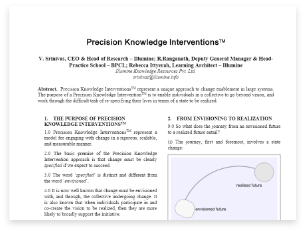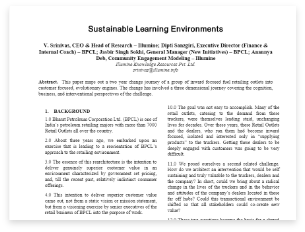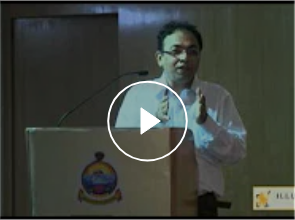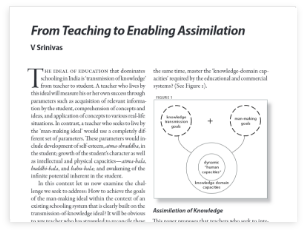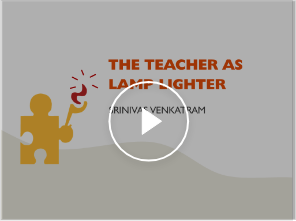
Currently available Titles:
Maps of Becoming - think tools for the Evolutionary Adventurer
~30 min.
How do we educate our future generations to a changing world? Srinivas explores this question in the Positive Economy Forum at San Patrignano, in 2015.
He presents new kinds of evolutionary capacities that are most likely to be needed in the coming future.
Knowledge Society – directions for the future
~30 min.
How has society’s relationship with knowledge evolved and transformed over time? What is the nature of the new emerging relationship in the 21st century?
This paper, presented in 2014 at the seminar “Swami Vivekananda’s Vision of Future Society”, held at the Ramakrishna Mission Institute of Culture, focuses on the foundation for the knowledge society we will see emerging in the 21st Century.
Learning to Contribute – an approach to Karma Yoga
~30 min.
Published in the Vedanta Kesari, 2014, this article outlines a journey from selfishness to Karma Yoga – the highest ideal for work in the Indian tradition, with Contributorship as the achievable middle step; and provides a 4-step roadmap to becoming a contributor
Education for Enablement
~30 min.
This exploration proposes a new purpose for education – through the prism of this purpose, education is viewed in terms of its ability to strengthen and enhance man's capacity to engage boldly and effectively with the challenges of life.
It outlines the scope of such an education as -
i) The development of self-esteem and individual personality attributes; ii) The development of appropriate mind sets; iii) The creation of task-relevant / professional capabilities (integrating learning and doing, development of practice-excellence etc.); iv) The development of "Engagement Practices" such as teaming, knowledge sharing etc.
Precision Knowledge Interventions
~30 min.
This paper outlines the approach for how can large-scale shifts in thinking be architected.
This paper was presented at The Third SOL Global Forum on “Bridging the Gulf: Learning across Organizations, Sectors, and Cultures ; organized by the Society of Organizational Learning in 2008.
Sustainable Learning Environments
~30 min.
This paper maps out a two year change journey of a group of inward focused fuel retailing outlets into customer focused, evolutionary engines. The change has involved a three dimensional journey covering the cognition, business, and interventional perspectives of the challenge.
This paper was presented at The Third SOL Global Forum on “Bridging the Gulf: Learning across Organizations, Sectors, and Cultures ; organized by the Society of Organizational Learning in 2008.
An Education for Human Excellence, beyond Academic Excellence
~26 min.
Swami Vivekananda proposed a fundamental shift in our vision of individual excellence and the role of education.The traditional view of education keeps 'academic capacities' at the center, and provides 'add-on skills' as extra-curricular programs etc.However, Swami Vivekananda's vision of man-making education was of developing 'dynamic human capacities' beneath the academic capacities. This presentation elaborates on this notion of 'dynamic human capacities' and how it can be developed in individuals.
From Teaching to Enabling Assimilation
~30 min.
Published in Prabuddha Bharata, in 2010, this paper elaborates upon what should be our techniques of education so that we don’t just transfer knowledge but help people transform.
How do we operationalize this into an organization? For this, we must recognize the importance of the ‘Collective Mind’ of the organization.
The Teacher as Lamplighter
~30 min.
This exploration is addressed to teachers (or any person engaged in the act of teaching). It proposes that, as teacher, I can play one of two roles – I could see myself in the institutional role of an education provider, or see myself as a lamp lighter, who seeks to invoke the highest in the individuals in my class. If we saw ourselves as lamplighters, what then would our role look like?
This video series helps you dive deep and explore potential answers to this question.
